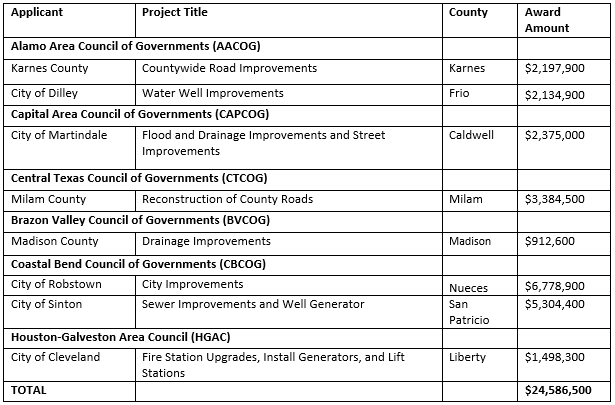Today, Texas Land Commissioner Dawn Buckingham, M.D., announced that the Texas General Land Office (GLO) approved $24,586,500 in regional mitigation funds to improve roads, water detention, drainage, and sewer systems in the cities of Dilley, Martindale, Robstown, Sinton and Cleveland, as well as in Karnes, Milam and Madison counties. Through the Regional Mitigation Program, the GLO enabled local prioritization, which will significantly impact communities across multiple regions.
"Investing in local infrastructure to mitigate against future disasters will enhance the quality of life and safety for residents across Texas," said Commissioner Buckingham. "The GLO is committed to working alongside community leaders to cut through federal red tape and expedite critical projects. We know that resilient infrastructure is key to helping Texas communities recover and thrive after severe weather events. Every day, the GLO stands with Texans to build stronger, safer places to live."

For more detailed project descriptions, please click here.
Texas GLO Regional Mitigation Program Council of Government Method of Distribution (COG MOD):
The Texas General Land Office (GLO) allocated $1,166,997,000 in Community Development Block Grant Mitigation (CDBG-MIT) funds from the U.S. Department of Housing and Urban Development (HUD) for the Regional Mitigation Program to reduce the risks and impacts of future natural disasters. Each Council of Government (COG) with HUD-designated eligible counties developed a method of distribution (MOD) for allocation of funds to units of local governments. Each COG developed their MOD through extensive public participation.
HUD defines mitigation as activities that increase resilience to disasters and reduce or eliminate the long-term risk of loss of life, injury, damage to and loss of property, and suffering and hardship, by lessening the impact of future disasters. HUD requires that at least 50% of total funds must be used for activities benefiting low-to moderate-income (LMI) persons. For more information, please visit recovery.texas.gov/mitigation.








